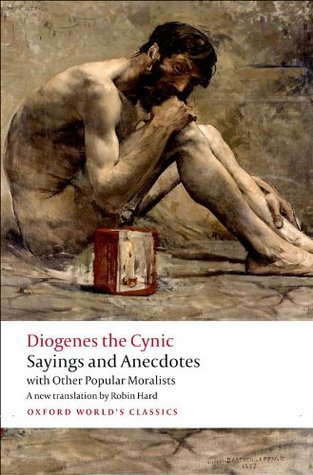More on this book
Community
Kindle Notes & Highlights
Casting scorn not only on luxury but on civilized life and culture in general, he tried to shock others into changing their lives by behaving in a provocative and shameless manner, and by subjecting people to his acerbic wit. He
He declares that he prides himself on his wealth even though he does not have a penny in the world. For while many who own a fortune remain unsatisfied and desire ever more, someone like himself, who is satisfied with a bare sufficiency, and recognizes that true wealth lies in one’s soul, cannot discover the bounds of his riches. What is more, he can pass on the wealth of his soul to anyone who desires it, and finds his greatest pleasure in conversing at leisure with like-minded people.
Diogenes was said to have remarked that even if people praised the Dog, none dared to accompany him on the hunt.
24b [May I recount] what Diogenes did with the man who declared that Athens was an expensive city. He took him in hand and led him off to a perfume-seller, and asked how much a half-pint of myrrh cost. ‘A mina’,* replied the seller, and Diogenes cried out, ‘The city is indeed expensive!’ And then he led the man off to a butcher’s shop and asked the price of a
choice cut of meat. ‘Three drachmas’, replied the butcher, and Diogenes said, ‘The city is indeed expensive!’ Next, to a seller of fine wools,
where he asked the price of a full fleece; ‘a mina’ was the reply, and he cried again, ‘The city is indeed expensive!’ ‘Here now’, he said, and took the man to a lupin-seller and asked, ‘How much for a quart?’ ‘A copper’,* was the reply, and Diogenes cried, ‘How cheap the city is!’ And then again to a seller of dried figs: ‘Two coppers.’ And to a seller of myrtle-berries, ‘Two coppers’; ‘How cheap the city...
This highlight has been truncated due to consecutive passage length restrictions.
lives expensively, and cheap if one lives cheaply. (Te...
This highlight has been truncated due to consecutive passage length restrictions.
34 When asked what wine he most liked to drink, he replied, ‘Somebody else’s.’*
He masturbated in the market-place one day and said, ‘If only one could do away with hunger by rubbing one’s stomach!’
When asked why people give to beggars but not to philosophers, he replied, ‘Because they expect that they may become lame and blind, but never that they will become philosophers.’
When asked what sort of things he did to be called a dog, he said, ‘I fawn on the people who give me something, bark at those who don’t, and sink my teeth into scoundrels.’
Diogenes would constantly say that to manage our lives properly, we need either reason or a rope.*
When asked what is the right time to marry, he replied, ‘For those who are young, not yet, for those who are older, never at all.’*
Cleomenes* recounts in his book On Pedagogues that the friends of Diogenes wanted to ransom him, but he responded by telling them that they were utterly naive; for lions, he explained, are not the slaves of those who feed them, but rather it is those who feed them that are the slaves of the lions;* for fear is what characterizes a slave, and wild beasts make men afraid of them.
To the foolish the truth is bitter and unpleasant, while falsehood
is sweet and agreeable; and likewise, I believe, for those who have diseased eyes, light causes pain, while darkness brings freedom from pain and is welcome, because it prevents them from being able to see.
When someone asked him why he failed to benefit from his own advice, he replied, ‘Neither do medicine-boxes which contain excellent medicine draw any benefit from it themselves.’
To the wise man nothing is alien or impracticable. The good man is worthy to be loved. One should ally oneself with those who are at once courageous and just. Virtue is a weapon of which one cannot be deprived. It is better to fight with a few good men against all who are bad than to fight with a multitude of bad men against a few who are good. One should pay good heed to one’s enemies since they are the first to recognize one’s errors. One should value an honest man above a relation. Virtue is the same for a woman as for a man. What is good is honourable and what is bad is shameful. Regard
...more
And now for my own part, I am not mean or grudging with anyone, but pass on this wealth that I have in my soul to anyone who wants it. Yes, and my choicest possession of all is, as you can observe, that I am always at my leisure, so that I can go off and see what is worth seeing, or hear what is worth hearing,
When asked what he had gained from philosophy, he said, ‘To be able to do without constraint what others only do through fear of the law.’*
To someone who asked him in what respect his son would be better for having an education, he said, ‘In this, if nothing else, that when he’s at the theatre he won’t just be one stone sitting on another.’*


